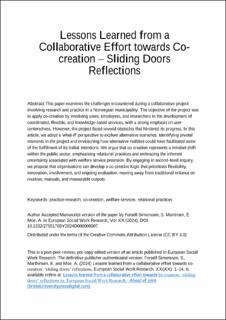| dc.contributor.author | Forsell Simonsson, Sanna Erika | |
| dc.contributor.author | Marthinsen, Edgar Martin | |
| dc.contributor.author | Moe, Anne | |
| dc.date.accessioned | 2024-03-07T09:11:18Z | |
| dc.date.available | 2024-03-07T09:11:18Z | |
| dc.date.created | 2024-02-20T11:02:07Z | |
| dc.date.issued | 2024 | |
| dc.identifier.issn | 2755-1768 | |
| dc.identifier.uri | https://hdl.handle.net/11250/3121386 | |
| dc.description.abstract | This article examines the challenges encountered during a collaborative project involving research and practice in a Norwegian municipality. The objective of the project was to apply co-creation by involving users, employees and researchers in the development of coordinated, flexible and knowledge-based services, with a strong emphasis on user-centeredness. However, the project faced several obstacles that hindered its progress. In this article, we adopt a ‘what if’ perspective to explore alternative scenarios, identifying pivotal moments in the project and envisioning how alternative realities could have facilitated some of the fulfilment of its initial intentions. We argue that co-creation represents a mindset shift within the public sector, emphasising relational practices and embracing the inherent uncertainty associated with welfare service provision. By engaging in second-level inquiry, we propose that organisations can develop a co-creative logic that prioritises flexibility, innovation, involvement and ongoing evaluation, moving away from traditional reliance on routines, manuals and measurable outputs. | en_US |
| dc.language.iso | eng | en_US |
| dc.publisher | Bristol University Press | en_US |
| dc.rights | Navngivelse 4.0 Internasjonal | * |
| dc.rights.uri | http://creativecommons.org/licenses/by/4.0/deed.no | * |
| dc.title | Lessons learned from a collaborative effort towards co-creation: ‘sliding doors’ reflections | en_US |
| dc.title.alternative | Lessons learned from a collaborative effort towards co-creation: ‘sliding doors’ reflections | en_US |
| dc.type | Journal article | en_US |
| dc.description.version | acceptedVersion | en_US |
| dc.rights.holder | Copyright © Authors 2024 | en_US |
| dc.source.journal | European Social Work Research (ESWR) | en_US |
| dc.identifier.doi | 10.1332/27551768Y2024D000000007 | |
| dc.identifier.cristin | 2247951 | |
| cristin.ispublished | true | |
| cristin.fulltext | postprint | |
| cristin.qualitycode | 0 | |

